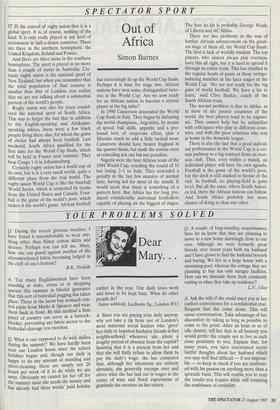SPECTATOR SPORT
Out of Africa
Simon Barnes
IT IS the conceit of rugby union that it is a global sport. It is, of course, nothing of the kind. It is only really played at any level of seriousness in half-a-dozen countries. There are three in the northern hemisphere: the United Kingdom, Ireland and France.
And there are three more in the southern hemisphere. The sport is played in no more than a couple of states in Australia. Cer- tainly rugby union is the national sport of New Zealand, but when you remember that the total population of that country is smaller than that of London, you realise that we are not talking about a substantial portion of the world's people.
Rugby union was also for years consid- ered the national sport of South Africa. This was to forget the fact that in addition to the English-speaking and Afrikaans- speaking whites, there were a few black people living there also, for whom the game of choice had always been football. Last weekend, South Africa qualified for the first time for the World Cup finals, which will be held in France next summer. They beat Congo 1-0 in Johannesburg. Certainly rugby union has a world cup of its own, but it is a very small world, quite a different place from the real world. The rugby union World Cup is like the baseball World Series, which is contested by teams from the United States and Canada. Foot- ball is the game of the world's poor, which makes it the world's game. African football has increasingly lit up the World Cup finals. Perhaps it is time for stage two. African nations have won some distinguished victo- ries at the World Cup. Are we now ready for an African nation to become a serious player at the big table?
In 1990 Cameroon decorated the World Cup finals in Italy. They began by defeating the world champions, Argentina, by means of speed, ball skills, appetite and a pro- found love of corporate effort, plus a Siberian coach to add a little tactical nous. Cameroon should have beaten England in the quarter-finals, but made the serious error of conceding not one but two penalties.
Nigeria were the best African team of the 1994 World Cup, reaching the round of 16 but losing 2-1 to Italy. They conceded a penalty in the last few minutes of normal time, having led for most of the match. It would seem that there is something of a pattern here. But Africa has for long pro- duced considerable individual footballers capable of playing on the biggest of stages. The best so far is probably George Weah, of Liberia and AC Milan.
There are two problems in the way of further African advancement on the great- est stage of them all, the World Cup finals. The first is lack of worldly wisdom. The top players, who almost always play overseas, have this all right, but it is hard to spread it through an entire team. This has resulted in the regular bouts of panic at these vertigo- inducing matches in the later stages of the World Cup. 'We are not ready for the big guns of world football. We have a lot to learn,' said Clive Barker, coach of the South African team.
The second problem is that in Africa, as in most of the poorer countries of the world, the best players tend to be expatri- ate. They cannot help but be unfamiliar with colleagues who play in different coun- tries, and with the poor relations who stay at home in the domestic league.
There is also the fact that a good individ- ual performance in the World Cup is a cer- tain pathway to a big contract from an over- seas club. Thus, even within a match, an individual player will have his own agenda. Football is the game of the world's poor, but the deck is still stacked in favour of the rich. In football, no playing-field is quite level. But all the same, where South Ameri- ca led, there the African nations can follow. And South Africa probably has more chance of doing so than any other.


























































 Previous page
Previous page